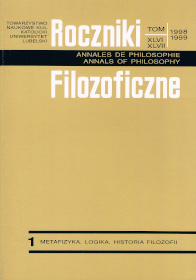Leibniza koncepcja prawdy
Abstrakt
The paper sought primarily to analyze the definition of truth put forward by Leibniz. The first part discusses the problems related to the bearer of truth. The following questions merit our attention: 1) is truth an epistemological category, or an ontological one? 2) what does truth state? 3) what does the difference between conception and judgement consist in? 4) what is the structure of judgement? 5) what arguments - according to Leibniz - are in favour of the intensional interpretation of judgement?
In the second part of the paper the very formulation of the definition of truth has been analyzed. The following questions have been underlined: 1) what reasons are there in favour of the classical (corresponding) approach to truth? 2) in what manner should the relation of correspondence be interpreted? 3) how did Leibniz seek to make precise the conception of correspondence between the structure of judgement and the structure of the state of things?
In view of the above considerations, it has been shown that truth - according to Leibniz - 1) is an epistemological category, 2) is the relational property of judgement in the logical sense, 3) its foundation being the relation of correspondence determined by three factors: a) the structure of judgement, b) the structure of reality, c) the correspondence between the structure of judgement and the structure of reality. The key concept here, which makes it possible to explain the correspondence of the structure of judgement and the structure of the state of things, is the concept of the isomorphism of relation. On the basis of those clarifications, it has been assumed that, according to Leibniz, the simple categorical judgement "A is B" is true if and only if there occurs the relation of isomorphic representation cp between the structure of judgement and the structure of the given state of things which that judgement concerns.
Copyright (c) 1999 Roczniki Filozoficzne

Utwór dostępny jest na licencji Creative Commons Uznanie autorstwa – Użycie niekomercyjne – Bez utworów zależnych 4.0 Międzynarodowe.





